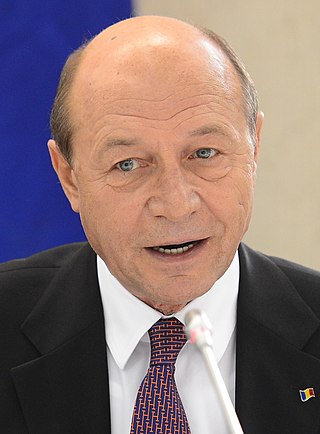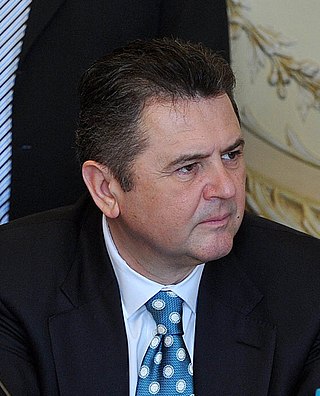
Romania's political framework is a semi-presidential representative democratic republic where the Prime Minister is the head of government while the President, according to the constitution, has a more symbolic role, is responsible for the foreign policy, signs certain decrees, approves laws promulgated by the parliament, and nominates the head of government. Romania has a democratic, multi-party system, with legislative power vested in the government and the two chambers of the Parliament, more specifically the Chamber of Deputies and the Senate. The judiciary is independent of the executive and the legislature. From 1948 until 1989, the communist rule political structure took place in the framework of a one-party socialist republic governed by the Romanian Communist Party (PCR) as its only legal party.
After the Communist rulership ended and the former Communist dictator Nicolae Ceaușescu was executed in the midst of the bloody Romanian Revolution of December 1989, the National Salvation Front (FSN) seized power, led by Ion Iliescu. The FSN transformed itself into a massive political party in short time and overwhelmingly won the general election of May 1990, with Iliescu as president. These first months of 1990 were marked by violent protests and counter-protests, involving most notably the tremendously violent and brutal coal miners of the Jiu Valley which were called by Iliescu himself and the FSN to crush peaceful protesters in the University Square in Bucharest.

Traian Băsescu is a Romanian conservative politician who served as President of Romania from 2004 to 2014. Prior to his presidency, Băsescu served as Romanian Minister of Transport on multiple occasions between 1991 and 2000, and as Mayor of Bucharest from 2000 to 2004. Additionally, he was elected as leader of the Democratic Party (PD) in 2001.

General elections were held in Romania on 28 November 2004, with a second round of the presidential elections on 12 December between former Prime Minister Adrian Năstase of the then ruling Social Democratic Party (PSD) and then incumbent Bucharest Mayor Traian Băsescu of the opposition Justice and Truth Alliance (DA), more specifically of the Democratic Party (PD). Băsescu was elected President by a narrow majority of just 51.2%. The 2004 presidential election was the fifth of its kind held in post-1989 Romania.
The Justice and Truth Alliance was a political alliance comprising two political parties in Romania, namely the centre-right liberal National Liberal Party (PNL) and the initially left-wing Democratic Party (PD), which later switched to center-right ideology.

Călin Constantin Anton Popescu-Tăriceanu is a Romanian politician who was Prime Minister of Romania from 29 December 2004 to 22 December 2008. He was also president of the National Liberal Party (PNL) and the vice-president of the European Liberal Democrat and Reform Party (ELDR), two positions he assumed in 2004.

The National Salvation Front was the most important political organization formed during the Romanian Revolution in December 1989, which became the governing body of Romania in the first weeks after the collapse of the totalitarian communist regime. It subsequently became a political party, the largest post-communist party, and won the 1990 election with 66% of the national vote, under the leadership of then-President Ion Iliescu, who was elected with 85% of the vote.

Eugen Bejinariu is a Romanian politician and member of the Social Democratic Party (PSD). He served as acting/ad interim Prime Minister of Romania between 21 and 28 December 2004, when former PSD Prime Minister Adrian Năstase, who had just been defeated in the 2004 presidential elections by Traian Băsescu, resigned and became President of the Chamber of Deputies.

Mihai Răzvan Ungureanu is a Romanian historian, politician who served as Prime Minister of Romania in 2012. He was the foreign minister of Romania from 28 December 2004 to 12 March 2007, and he was appointed as Director of the Foreign Intelligence Service later in 2007. Following the resignation of the Emil Boc government he was appointed Prime Minister serving through April 2012 when his cabinet was dismissed following a parliamentary vote of no-confidence. He was confirmed by the Parliament for a second term as Director of the Foreign Intelligence Service, after President Klaus Iohannis nominated him in June 2015 but he resigned in September 2016, citing health issues.

The Christian Democratic National Peasants' Party is a Christian democratic and agrarian political party in Romania. It claims to be the rightful successor of the interwar National Peasants' Party (PNȚ), created from the merger of the Romanian National Party (PNR) from the then Austro-Hungarian-ruled Transylvania and the Peasants' Party (PȚ) from the Romanian Old Kingdom.

The Conservative Party was a conservative political party in Romania. It was founded in 1991, approximately two years after the fall of Communism in Romania, originally under the name Romanian Humanist Party. From 2005 until 3 December 2006, the party was a junior member of the Government of Romania. The party adopted the name Conservative Party on 7 May 2005. Subsequently, a little bit more than a decade after, more specifically in June 2015, it merged with the Liberal Reformist Party (PLR) to form the Alliance of Liberals and Democrats (ALDE).

Emil Boc is a Romanian politician who was Prime Minister of Romania from 22 December 2008 until 6 February 2012 and is the current Mayor of Cluj-Napoca, the largest city of Transylvania, where he was first elected in July 2004. Boc was also the president of the Democratic Liberal Party (PDL), which proposed and supported him as Prime Minister in late 2008, from December 2004 until July 2012.

Parliamentary elections were held in Romania on 30 November 2008. The Democratic Liberal Party (PDL) won three more seats than PSD in the Chamber of Deputies and the Senate, although the alliance headed by the Social Democratic Party (PSD) won more votes and a fractionally higher vote share. The two parties subsequently formed a governing coalition with Emil Boc of the PDL as Prime Minister.

The Liberal Democratic Party was a political party in Romania, formed in December 2006 as a breakaway/splinter group from the National Liberal Party (PNL). The Liberal Democratic Party was headed by Theodor Stolojan, a former PNL leader, and included a series of prominent former National Liberals, such as Gheorghe Flutur, Mona Muscă, and Valeriu Stoica, who were opposed to the leadership of the PNL, then headed by former Prime Minister Călin Popescu-Tăriceanu.

Bogdan Niculescu-Duvăz was a Romanian politician and architect. A member and twice minister of the Democratic Party (PD), he joined the Social Democratic Party in 2003, and was again a minister in 2004. Niculescu-Duvăz was a member of the Chamber of Deputies between 1990 and 2016.

The Democratic Liberal Party was a liberal-conservative political party in Romania. The party was formed on 15 December 2007, when the Democratic Party (PD) merged with the Liberal Democratic Party (PLD). On 17 November 2014 the PDL officially merged into the National Liberal Party (PNL), ceasing to exist. The PDL was associated with Traian Băsescu, who was previously leader of the PD and President of Romania from 2004 to 2014.

Raluca Turcan is a Romanian politician. A member of the National Liberal Party (PNL), she has been a member of the Romanian Chamber of Deputies for Sibiu County since 2004.

The National Union for the Progress of Romania is a political party in Romania. The party was formed in March 2010 by independents who had broken away from the Social Democratic Party (PSD) and the National Liberal Party (PNL) to support President Traian Băsescu. Tension began soon after the party's formation between former PSD and PNL members over the distribution of leadership positions and the political direction of the new party, with former PSD members dominating. The first party congress to elect its leaders was on 1 May 2010.



















